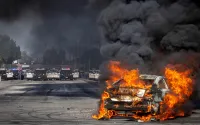8 June 2007Colin Brown
Lord Goldsmith, the Attorney General, faces questions over allegations he ordered British investigators to conceal from an international corruption watchdog the existence of secret payments to a Saudi prince.
Tony Blair advised Lord Goldsmith to call off the Serious Fraud Office's investigation into bribery and corruption after evidence emerged that payments totalling £1bn over more than a decade had been made by BAE to Prince Bandar in the £43bn Al Yamamah arms deal.
SFO investigators had uncovered evidence of secret payments, allegedly sanctioned by the Ministry of Defence, to a US bank account controlled by Prince Bandar, the Saudi ambassador to Washington for 20 years. The SFO was pursuing a possible prosecution when the Attorney General stepped in last year and halted the investigation.
Now sources close to the OECD, the international body which began its own investigation as a result of that decision, have told a national newspaper: " We suspected that the British were holding some secret back." Lord Goldsmith is believed to have warned colleagues that "government complicity" in the payments would be revealed if the SFO inquiry proceeded any further.
A spokesman for the Attorney General said full evidence had not been given to the OECD in order to protect national security.
Prince Bandar last night issued a statement categorically denying receiving any improper secret commissions or backhanders over the Al Yamamah deal.
Jonathan Aitken, a former Tory defence minister, was also drawn into the controversy yesterday. He was jailed for 18 months for perjury after denying a stay at the Paris Ritz was paid for by another Saudi prince, but yesterday denied all knowledge of MoD-sanctioned payments of commission for the deal. " I was not told [of the deal] and my boss, Sir Malcolm Rifkind was not told," he said.
However, Mr Blair will face questions from furious Labour MPs on Monday when he makes a Commons statement on his last G8 summit. Standing with President George Bush at the summit in Germany, he said Saudi Arabia had threatened to halt co-operation in the "war on terrorism", including the hunt for the Saudi founder of al-Qa'ida, Osama bin Laden, if the prosecution went ahead.
"This investigation, if it had gone ahead, would have involved the serious allegations and the investigations being made about the Saudi royal family," he said. "My job is to give advice as to whether that is a sensible thing in circumstances where I don't believe the investigations would have led anywhere except to the complete wreckage of a vital strategic relationship for our country in terms of fighting terrorism, the Middle East, and British interests."
Mr Blair also said thousands of British jobs in the aerospace industry would have been lost. The contract named after the Arabic word for " dove" was for 120 British-built Tornado aircraft and amounted to Britain's biggest ever arms deal. It was struck by the Thatcher government in 1985 and signed by Michael Heseltine, then the defence secretary, but Saudi relations were carefully maintained by successive prime ministers, including John Major and Mr Blair, who regularly visited the country.
In 2001, after Jack Straw took over from Robin Cook as foreign secretary, the Blair Government made bribes to overseas officials a criminal offence in the Anti-terrorism, Crime and Security Act. The SFO was looking at whether the payments for "marketing services" by BAE constituted an offence when the case was halted by the Prime Minister's intervention.
Responding yesterday to Liberal Democrat protests, Mr Straw said: "The world's not perfect. The Government face a choice of seeing co-operation on national security being withdrawn."
He said the Attorney General had judged it was unlikely that a prosecution would have succeeded because of the lack of evidence. Mr Straw also told MPs that the High Court judge Mr Justice Collins last week dismissed a request for a judicial review of the SFO's decision, saying the application was " wholly unarguable".
Mr Justice Collins said in his ruling that "no state could be expected to take action which jeopardises the security of the state or the lives of its citizens".
Mr Straw said: "We face a very serious terrorist threat in this county. We vitally need co-operation, as we have received, from... Saudi Arabia and the Prime Minister was absolutely right in not seeking to jeopardise that."
Labour MPs are calling for the SFO inquiry to be revived, and said Mr Blair had risked the wrath of Russia to uphold the rule of law in the pursuit of a prosecution over the death of Alexander Litvinenko, but had ditched it for the Saudi arms deal.
How the furore unfolded
1985
Defence Secretary Michael Heseltine signs first phase of £50bn Al Yamamah arms deal for Thatcher government with the Saudi government.
1987
First aircraft delivered by British Aerospace (later BAE Systems).
1992
Contract investigated by National Audit Office. Report never published.
2001
Anti-Terrorism, Crime and Security Act (ATCSA) 2001 extended the jurisdiction of the courts over corruption offences occurring wholly overseas.
2003
Newspaper allegations about a secret slush fund into which BAE paid bribes. It strongly denied the claims.
2004
BAE Systems confirms it is being investigated by the Serious Fraud Office.
2005
BAE announces provisional agreement to supply Saudi Arabia with Eurofighter jets. Talks to finalise the deal continue throughout 2006.
1 December 2006
BAE Systems admits that negotiations over the Euro-fighter have slowed down. A French planemaker says it is in talks to sell a rival jet to Saudi Arabia.
14 December 2006
Lord Goldsmith, the Attorney General, announces that the SFO is dropping its investigation because of the "need to safeguard national and international security".
17 January 2007
OECD has "serious concerns" about the British inquiry being dropped.
6 June 2007
Ex-Saudi ambassador to the US, Prince Bandar bin Sultan, who negotiated the deal is alleged to have received secret payments for more than a decade.
7 June 2007
Tony Blair says it was right to drop SFO investigation for security reasons.
http://news.independent.co.uk/uk/politics/article2631518.ece






